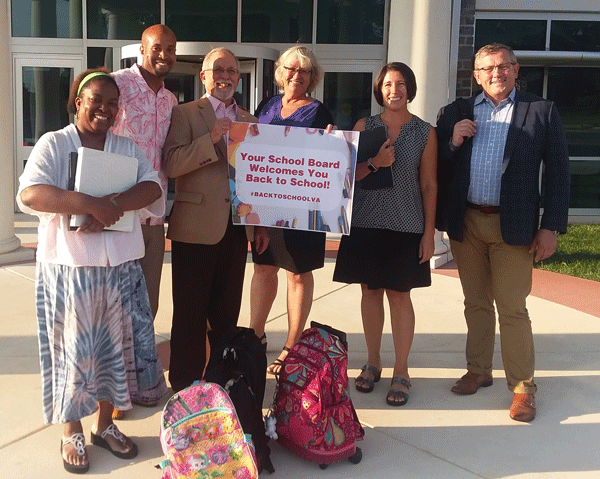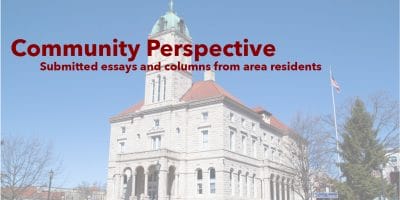
School Board members (from left) Kaylene Seigle, Obie Hill, Andy Kohen, Deb Fitzgerald, Kristen Loflin and Nick Swayne posed for a back to school photo before their meeting earlier this month. Students returned to school this week. (Photo by Randi B. Hagi)
By Randi B. Hagi, senior contributor
Harrisonburg students attended their first day of classes Tuesday, but because of a change in Medicaid approvals, some of them walked into school with less support than they had last year.
April Howard, the school district’s executive director of psychological and student services, announced in a school board work session Tuesday evening that they had been informed on Friday that many city students were denied Medicaid reauthorization for therapeutic day treatment services.
Medicaid, while largely funded by the federal government, is administered by states and is aimed at covering health care costs for those who are disabled or financially struggling.
The city contracts therapeutic day treatment services from Crossroads Counseling Center. In the schools, the day treatment counselors typically have a caseload of seven or eight students who are eligible under Medicaid and who have “significant behavioral disruptions” and could be at risk of being removed from their home, Howard said.
Last year, 30 high school students were authorized for these services. This year that number was three.
And some city students who have previously been approved for six-month rounds of services were only granted two or three months this time. But Howard said Medicaid didn’t change criteria for who qualifies, which would mean some children whom Medicaid previously approved got denied this time.
The students have to wait four to six weeks before attempting to reapply.
The change isn’t just affecting Harrisonburg. “They’re calling it a TDT crisis” across the state, Howard said.
“These are very important services for our kids,” Superintendent Michael Richards said.
Richards said he is taking three approaches to address the sudden constriction of services. One is to address state legislators. Another is to look at the budget, he said, and possibly hire more behavioral therapists. Richards will also look to community service providers to help return students to therapeutic services.
Richards turned to the school board members to ask them lobbying assistance.
“So if you are interested in working with me on that at the legislative level –” he began, before school board chair Deb Fitzgerald led a chorus of “yes!”
Audit inspires changes in HHS special education
The school board also received suggestions to better oversee and administer Harrisonburg High School’s special education program through a voluntary audit — one that already has sparked changes in the high school.
“This is something we asked for … to improve ourselves,” Richards said.
Pat Lintner, the district’s chief academic officer, said both student performance data and anecdotal evidence led them to procure the audit from Mathews Educational Consulting, LLC.
Area parents have called for improvements to the city’s special education system, particularly for high school students. Approximately 170 students receive special education services across city public schools.
“A lot of the findings had to do with consistency in systems,” Richards said, such as communicating student data in a timely and accurate manner.
Other suggestions from the audit included stronger administrative supervision, more collaboration between special education and general education teachers and developing the master schedule around special instruction, rather than treating special instruction as an add-on.
Lintner said the report also noted that the district has “a warm, caring staff.”
Those staff members already have been implementing new procedures as a result of the audit.
Sandi Thorpe, director of special programs, said the audit was helpful “to improve our outcomes at the high school.”
Lintner said that Principal Melissa Hensley, who took the helm of Harrisonburg High School this summer, “hit the ground running.”
Hensley first tackled the communication issues – in part, by making assistant principals each responsible for cohorts of students, which includes overseeing Individualized Education Plans for students in the special education program.
Previously, just one staff member was responsible for reviewing those plans.
“It becomes overbearing for one administrator,” Hensley said.
She has also had special education teachers meet in person with general education teachers to ensure the latter understand specific accommodations students with disabilities need in class.
Hensley called this an “all-hands-on-deck approach.”
Richards, the superintendent, said meeting staffing needs also remains a priority.
“It’s very important that we have a contingency line in the budget to be able to add special education staff as needed,” Richards said.
Future improvement plans include having students play a larger role in designing their Individualized Education Plans.
“I’m a big advocate for student voice,” Hensley said.
Also at the meeting:
- The first day of school’s enrollment count topped last year’s numbers by about 200. It’s 5,884 compared to 5,697 in 2018. And that number will grow as students start school late for a variety of reasons. Last year’s student population “ended up…cresting (at) 6,000,” Lintner said.
- Executive Director of Human Resources Andrew Ansoorian presented on hiring statistics going into the new school year. The district hired 74 new teachers this year, with just two teaching positions remaining empty. The percentage of applicants for teaching positions who are people of color was up to 26.3 percent from 18 percent in 2015.
- School board member Nick Swayne gave some homework to superintendent when he asked what teachers, on average, spend out-of-pocket on classroom supplies. “We’ll figure that out,” Richards said.
Journalism is changing, and that’s why The Citizen is here. We’re independent. We’re local. We pay our contributors, and the money you give goes directly to the reporting. No overhead. No printing costs. Just facts, stories and context. Thanks for your support.














